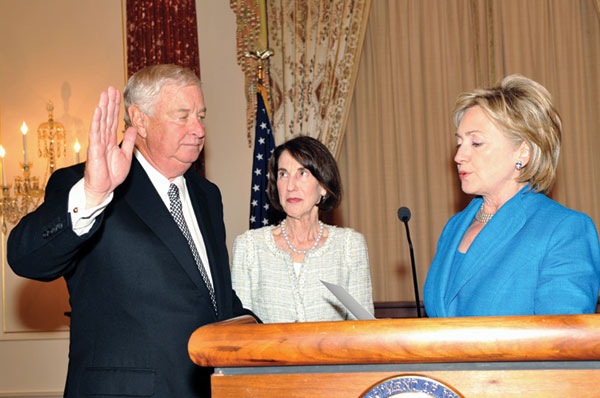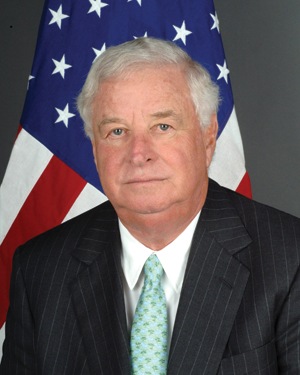Louis Susman: Obama’s man in Britain
In his first print interview with the Northern Ireland media, US Ambassador Louis Susman told Ryan Jennings and Peter Cheney why he thinks the special relationship is still strong and answered the financial question hanging over his appointment.
America and Britain’s special relationship has been tried by many crises in the past and is still often tested, whether in foreign battlefields, over the Lockerbie case or amid the economic troubles encountered by Wall Street, the City or ‘main street’ in both lands.
Yet it stands strong above those challenges, according to America’s new man in the UK, Louis Susman, who met agendaNi on the second morning of his visit to Northern Ireland in mid- September, at Ardnavally, the Consul- General’s residence in south Belfast. Our half-hour interview covered what the special relationship means today, Northern Ireland’s place within it and his response to claims that his appointment was linked to his fundraising for the Obama campaign.
Notably, the Ambassador also passed on the President’s thanks to Northern Ireland soldiers serving in Afghanistan and their families. The increasingly controversial conflict is seen by Obama as a “war of necessity” against al-Qaida.
“The United Kingdom and people here in Northern Ireland have been our allies in Afghanistan. There’s not enough words we can express as Americans for the commitment of soldiers and resources to that crucial fight,” he remarks.
“And I don’t know how many have been lost from Northern Ireland but I’m sure there’s been some. Our condolences to those families, to those brave young men and women, but on my President’s behalf, I want the message to be very strong: how much we appreciate their effort. And I think things like that also add to the special relationship.”
As his government’s highest ranking official in the UK, Susman’s role is to represent the “strategic objectives” of the United States in the United Kingdom.
Arriving in mid-August, there was a “fast pace” to his first month in post, in contrast to what he had expected.
“From my business experience, I’d always heard that August was a kind of dead month in the United Kingdom so I had planned to come the last two weeks of August and kind of ease my way in,” he says. “It hasn’t worked that way at all. It’s been almost like drinking from a fire hose.”
The release of the Lockerbie bomber and the two governments’ differing views put trans-Atlantic links in the spotlight.
General David Petraeus and Middle East envoy George Mitchell also paid visits. Susman has met with Gordon Brown, David Cameron and was introduced locally to Peter Robinson and Martin McGuinness.
Asked for his priorities, Susman makes clear that the first is to ensure that the special relationship “not only continues but is enhanced, strengthened and nourished.”
He notes that various reports have suggested that the relationship may have been lessened but emphasises that nothing could be further from the truth.
“Obviously, we’re not naïve enough to assume we’re going to agree on everything. We certainly didn’t agree on the Megrahi decision but this in no way is material enough or substantive enough to say that there’s been a breach of this relationship.”
Public diplomacy
Second on the list is public diplomacy i.e. to explain US foreign policy to foreign audiences. He sat on the United States Commission on Public Diplomacy, an advisory body, in the 1980s, and is especially interested in reaching out to the UK’s large Muslim community, which has strong links to Pakistan. Quoting Obama’s Cairo speech, he points out that the USA is not against Islam but against extremists.
This work also covers the Administration’s activity in Northern Ireland, where it hopes that the devolution of justice and policing can be worked out.
“We’ve invested a lot,” he says with emphasis, “in this part of the world and we’re thrilled that the peace process has progressed to where it is.”
Economic development is a personal priority for him, given his business and law career over 40 years. He was previously Vice-Chairman of Citigroup’s corporate and investment banking arm, and hopes that his advice could be helpful if asked. The Titanic Quarter project left a particularly strong impression on him.
His third priority is to keep American citizens safe and be available when they need help. If a US citizen should die, their remains will have to be repatriated and it is his embassy which will help in that. He may also be required to stand as an advocate for a particular US industry or company in the UK.
On a more national basis, he adds that he will be working very closely with intelligence authorities in London and across the UK, as preventing terrorism not only benefits UK citizens but also his own.
Susman had visited Ireland before and admits to a love for the country. He plans to return regularly.
“The people are as friendly and as welcoming in the North as they are in the South. People open their homes and their hearts and their minds to me,” Susman comments, before adding on a serious note: “In many ways, it’s somewhat paradoxical. It’s a very joyous people but also it’s a very serious group of people because of the problems they faced in the past.”
Irish America – with its “intense” links to Ireland – adds another dimension to the special relationship for Northern Ireland. While admitting to Americans’ tendency to “jump too quick”, he had tried “very hard” to listen and learn on his trip to the province.
Commencing public diplomacy, he invited 250 British Muslims to an iftar, an Islamic meal, at his residence. He senses that within that community “there is an element that definitely wants to engage and work together but there’s also an element that is more difficult to reach.”
“In certain areas, that community has congregated as one. Some would say they might be ghettoised in these old mill towns. The main thing is they’ve got no jobs,” he continues, before pointing out that problem’s local relevance.
“The unemployment is some of these areas is immense and among young people is really high, much higher than any of the statistics we see. And that becomes fertile ground for discontent and you can relate that to right here in Northern Ireland. I think your greatest threat to peace is if the economic climate doesn’t improve so people have jobs and money to spend, you can buy homes or pay their mortgages, or have some form of it, that breeds discontent.”
Change?
Barack Obama’s famous victory under the banner ‘change’ has convinced a great many people that his administration will be exactly that. However, in some quarters of the media, Susman’s appointment has been described as a return to cronyism given his role in raising reportedly over $500,000 for Obama’s campaign.
He responds to that accusation saying that throughout the US’ history of appointing ambassadors, his particular post has been given to someone “deeply involved” in the political or business world or, in his case, a deep friendship.
“In our system we have a great group of professional State Department career people who make great ambassadors but it has been historical that if there are 180 ambassadorships to be appointed, somewhere around a third or less will be what we call political appointees,” he adds.
Susman says he is intimidated by the fact that five ambassadors to London have gone on to become presidents. His own take on his appointment is that it would be unreasonable to expect a president to choose someone he does not like or doesn’t know. It is rather more likely that he will appoint somebody who he knows will do a good job as it will reflect on him.
“If raising money to help Obama to become president,” Susman adds, “or that we’re close friends,” is cronyism, then, he concedes, he is guilty. He contends that Obama has chosen the person who he thinks will do a good job: “I know he feels that way about me and my fundraising record isn’t going to help me much on this.”
He and Obama, it seems, are close friends and the Ambassador clearly admires his fellow Chicagoan: “He’s an amazing man and I would suggest to you that the popularity even here in Northern Ireland [shows that] and all over the world. We sometimes have to say: ‘He’s our President.’”
Although taking office in the midst of two wars and almost a depression, Susman believes that Obama has been able to make his mark. “There has been immense change. I think the first change has been the openness and the transparency of this administration. If you go back and see the executive orders at Guantanamo, if you see how he’s opened the White House visitors’ log – never been done before.”
The biggest step change that America will see will be in healthcare. Indeed should a healthcare Bill go through, Obama will be the first president to sign a Bill of its kind. “I predict we will have a healthcare Bill. I can’t tell you exactly what it will look like but there will be some form of national health insurance for those who don’t have it,” he says.
While providing insurance for “some 40 million” people who have not got it is one thing, Susman explains that Obama’s administration believes that the only way to solve America’s economic problems is to bring costs down, which he says are “out of control”.
One of the major contrasts with this administration as opposed to those before it is the ability to communicate with the average person: “I don’t even remember how many million people supporters we had on the internet.” That interaction, he contends, will continue through YouTube and other networking sites.
When put to him that the expectations Obama is facing could be too high, Susman agrees: “Many of us do worry that expectations are too high. He does not walk on water, I can attest to that. Many people think we’ve taken on too many issues early on but we had no choice.” He suggests that the President is not running to be re-elected but will rather “do what’s right” and let the 2012 election take care of itself.







